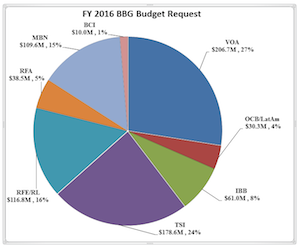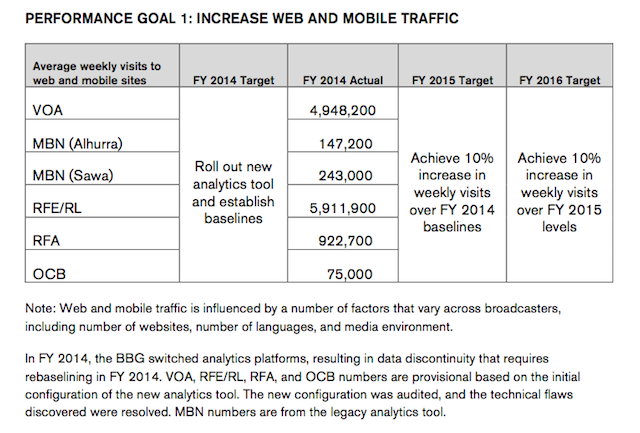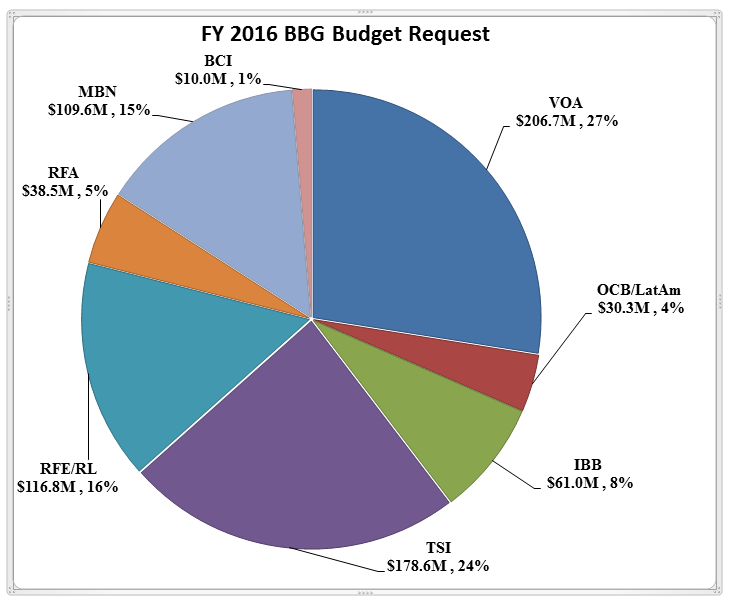BBG Watch Media
RT, which used to be called Russia Today, is “Putin’s weapon of choice in the war of communication,” France24 English reported (see video).
Russia Today: Putin's weapon of choice in the war of communication
Posted by FRANCE 24 English on Monday, March 23, 2015
Voice of America (VOA) has English language “newsroom staff that is down about 20 percent from three years ago,” according to a VOA management email (see below) about proposed news reforms at the U.S. taxpayer-funded media outlet targeting international audiences.
QUESTION: What can we expect from this latest move by VOA management?
QUESTION: As a Voice of America journalist or a reader of Voice of America news websites and social media platforms or listener and/or viewer of VOA radio and TV programs, do you find this statement by VOA management sufficiently reassuring?
“For that reason, when using wire stories on air it is best to properly attribute the information (eg. The AP is reporting that …) so that when there is an error, it will be the wire service’s error, not ours.”
In the last seven to eight years, the number of positions at the International Broadcasting Bureau (IBB) with Office of Technology, Services, & Innovation (TSI) — the management and program support arm of the Broadcasting Board of Governors (BBG), the federal agency in charge of VOA — is estimated to have grown by close to 37 percent.
VOA budget is also growing: from $196,357,000 in FY 2013 to $209,639,000 in FY 2014, $212,497 FY 2015 Program Plan, and $206,683,000 FY 2016 Budget Request.
VOA is also the largest beneficiary from IBB-TSI combined budget which accounts for 32% of the entire FY 2016 BBG Budget Request. VOA’s exclusive share of the BBG budget is 27% ($206.7M).
QUESTION: Do you think the latest Voice of America memo outlining proposed changes or reforms in news gathering and reporting will make VOA truly competitive with RT as a news organization?
We are re-posting the VOA news reforms email (see below), our earlier report about Time magazine article on RT and RT’s response to that article, “TIME v RT, plus Broadcasting Board of Governors,” as well as two other recent BBG Watch commentaries: “Where have all the Voice of America correspondents gone?” and “U.S. media agency BBG leagues behind BBC and RT in web traffic.”
We also include two recent BBC press releases: “BBC.com users hit 100 million mark” and “BBC World News reaches new distribution milestone.”
And two RT press releases: “RT ARABIC IS AMONG TOP-3 MOST WATCHED NEWS CHANNELS IN 6 ARABIC COUNTRIES” and “RT IS #1 NEWS NETWORK ON YOUTUBE WITH 2BLN VIEWS.”
We are also reposting one of the latest BBG press releases: “BBG 2016 Budget Request Calls For Expansion In Key Markets And Technologies.” The latest email from Voice of America management about VOA newsroom reforms should be read in conjunction with the BBG press release.
QUESTION: Will the latest VOA email and plans outlined in the BBG press release finally fix the problem, which then Secretary of State Hillary Clinton described to the House Foreign Affairs Committee in January 2013 and later wrote about it in her book Hard Choices?
HILLARY CLINTON: “Our Broadcasting Board of Governors is practically defunct in terms of its capacity to tell a message around the world. So we’re abdicating the ideological arena and we need to get back into it. We have the best values. We have the best narrative. Most people in the world just want to have a good decent life that is supported by a good decent job and raise their families and we’re letting the Jihadist narrative fill a void. We have to get in there and compete and we can do it successfully.”
###
Voice of America Email
Sent: Monday, March 23, 2015 2:13 PM
To: VOA Language Service Chiefs; VOA Language Service Division Directors; VOA Language Programming Directorate
Subject: Important Change in Central News output
Attention Service and Division Chiefs:
Central News is tentatively planning to end the issuance of traditional CNs as early as next week. The Language Programming Directorate is scheduling a meeting for Tuesday to facilitate discussion of the plan and to hear any concerns. To facilitate a full and productive discussion at that meeting, here is an outline of the plan as it now stands.
WHAT WE WON’T DO: Central will no longer compile and issue traditional CNs, which are essentially a compilation of material available from and agreed upon by multiple wire services or other reputable news outlets.
WHAT WE WILL DO: Central will continue to compile and issue OCNs (Original CNs) which include original reporting by VOA reporters combined with wire service content. It will publish recommended wire stories in Dalet, and include the most important of these in the Lineups. It will, when feasible, issue short CRs of under one minute with one soundbite to help services build their newscasts. It will continue to seek audio and video from agency feeds that can be used with either OCNs or wire stories.
WHAT IT WILL LOOK LIKE: A future Lineup may consist of tho AP stories, one Reuters story, two OCNs and a short CR. When we publish a recommended wire story in Dalet Plus it will appear in the Published folder just as CNs and OCNs do now. It will include a note at the top telling you whether we plan to follow up with an OCN or not. It will look something like this:
The following AP story is recommended for your use. It may be published on websites with AP credit or read on air with attribution to AP. Central News is seeking to advance this story with an OCN (Or, Central News does not plan to pursue this story; please watch the AP wire for updates).
AP 4 – 03/18/15 12:16:00.000 – BC-EU–Greece-Bailout
*1155 AP-EU-Greece-Bailout,473
a0860
Greek leader defiant ahead of bailout meeting
AP Photo ATH103, ATH102, ATH101, ATH109, ATH106, ATH110
Eds: Adds comment from German vice chancellor, market reaction. With AP Photos.
By DEREK GATOPOULOS and GEIR MOULSON=
Associated Press=
ATHENS, Greece (AP) _ Greek Prime Minister Alexis Tsipras insisted Wednesday his government will honor an election promise to end budget austerity _ a note of defiance ahead of an expected meeting with the leaders of Germany and France on the country’s troubled bailout. Etc.
WHAT WE LOSE: Since its inception, VOA has adhered to a principle of not airing any information not coming from its own reporters which is not available from at least two wire agencies or other reputable news organizations. This “belt and suspenders” approach was based on the belief that VOA should be more accurate and more reliable than anyone else, including the wires. The credibility we have earned over seven decades is our most precious asset and must be protected. Therefore Central editors will recommend only wire stories where we have a high level of confidence in their accuracy. Even then, there will be times when the wires pull back or correct stories we have recommended. For that reason, when using wire stories on air it is best to properly attribute the information (eg. The AP is reporting that …) so that when there is an error, it will be the wire service’s error, not ours.
WHAT WE GAIN: This change will free up staff and resources within Central News to pursue our new commitment to a “digital first” workflow while continuing to provide a robust daily report for radio and television, even with a newsroom staff that is down about 20 percent from three years ago. It will mean that breaking news gets to your services faster because you don’t have to wait for a CN staffer to find a matching story from a second agency and then re-write the two reports into one. Most important, it will provide us with more manpower to pursue unique content that will enable VOA to stand out from other news organizations in an increasingly crowded online marketplace. It will also mean we have more staff available to come into the language services and help get your great original content out to the house and the English website.
NOTE: If you have strong feelings for or against this plan, please come to Tuesday’s meeting and express yourself. The digital-first reorganization of Central News, English Webdesk and other departments is moving ahead rapidly and a final decision must be made soon. Thank you.
###
TIME v RT, plus Broadcasting Board of Governors
March 16, 2015
BBG Media
TIME magazine has an article on Russia’s external media outlet RT, which was quickly countered with what looks like a lady doth protest too much op-ed by Margarita Simonyan, RT’s Editor-in-Chief.
Both articles include budget figures (some contested) for international broadcasting operations by RT, BBC, and BBG. Both have references to U.S. international media outreach through the Broadcasting Board of Governors.
TIME
Inside Putin’s On-Air Machine | TIME
Putin founded RT in 2005 with a budget of about $30 million and gradually ramped it up to more than $300 million per year by 2010. (By comparison, the BBC World Service Group, which includes TV, radio and online news distribution, has a budget of $376 million for 2014–15. The BBC’s International Service is the biggest broadcast newsgathering operation in the world.)
…
In a direct response to Russia’s propaganda efforts against Ukraine, the U.S. Congress passed a bill [BBG Watch: U.S. House of Representatives passed it, but there was no vote in the Senate; the bill did not become law.] in July to make the state-funded Voice of America a more direct mouthpiece for U.S. foreign policy, shifting away from its mission of providing uncensored local news in places where it’s hard to find. “We are trying to counter Russian propaganda—and that of our adversaries throughout the world—with one hand behind our back,” said Ed Royce, chairman of the House Foreign Affairs Committee, as he urged President Barack Obama to support the legislation.
MORE
RT
Once upon a TIME | RT
Now, I can empathize with the challenge of trying to write an honest-to-goodness sad-sack story about the outspent (and new favorite epithet, ‘outgunned’) Western media at a time when RT is broadcasting multiple 24/7 TV channels around the world for the mind-blowing sum of $225 million, while the UK’s BBC World Service and the US’ Broadcasting Board of Governors (BBG, which includes Voice of America and Radio Free Europe) – both running predominantly online and radio services with small and sporadic television presences in a handful of regions – receive $375 million and $721 million respectively.
…
The problem is that BBC’s “International Service” isn’t a thing in and of itself. It is the newsgathering department of BBC News (budget – $530 million), which is part of the British Broadcasting Corporation (budget – over $7 billion), funded through the license fee that is charged to every UK household with a TV.
MORE
###
Where have all the Voice of America correspondents gone?
March 15, 2015
BBG Watch Guest Commentary
BBG Watch occasionally publishes guest commentaries. This one is from MC, a longtime Voice of America radio listener and reader of its English news website, who currently lives in the United Kingdom.
Views expressed here are only those of the author and not of BBG Watch, its volunteers, or sponsors.
We invite those with opposing views and others who want to comment on this or other issues followed by BBG Watch to submit their op-eds for consideration.
 According to a program description the Voice of America website, VOA’s “International Edition gives you 30 minutes of in-depth world news reported by VOA’s worldwide corps of correspondents – on the events people are talking about. Updated 10 times a day.”
According to a program description the Voice of America website, VOA’s “International Edition gives you 30 minutes of in-depth world news reported by VOA’s worldwide corps of correspondents – on the events people are talking about. Updated 10 times a day.”
But does the Voice of America deliver on radio or on its website what it promises to deliver? – “in-depth world news reported by VOA’s worldwide corps of correspondents.”
MC, our occasional contributor in the UK who prefers to remain anonymous, has sent us observations on Voice of America news reporting. Many of his observations happen to match ours.
Voice of America correspondent reports are now much less common on VOA English radio news programs and on the VOA English news website than they were several years ago before the current senior management took over, even though VOA still has several overseas news bureaus. They cost U.S. taxpayers almost $8 million a year. In addition, VOA still has a few domestic news correspondents.
The VOA Central English News Division annual budget is approximately $16 million. Our commentator observed that only there were no reports from Voice of America foreign correspondents included in the 17:05 UTC International Edition VOA program on March 11, but the program had only one U.S.-based expert commenting on news developments. Three other experts who were interviewed were from outside of the United States. They were not even from countries where news events being discussed were taking place, or to which VOA primarily directs its news programs.
“Additionally, the outside experts (one each in Canada, Australia, and the U.K.) had less of an American angle than I would have expected from The Voice of America,” our commentator wrote.
Our commentator made these observations shortly after Broadcasting Board of Governors (BBG) director and CEO Andy Lack had left his post after only a few weeks on the job. The BBG oversees the operations of the Voice of America and other U.S. taxpayer-funded media entities serving audiences abroad.
A decline in posting Voice of America correspondent reports online and using them on radio had started under the current senior VOA management several years before Andy Lack’s arrival.
There may have been a slight improvement in foreign and U.S. news coverage on the VOA English website while Andy Lack was briefly at the agency in an apparent effort by VOA managers to impress him, but as soon as he left the job, things seem to have gone back to the way they were before.
While several VOA correspondent reports were posted online on March 11, very few were posted before 17:00 UTC. Most were posted during the night in Europe, Africa, Middle East and parts of Asia.
Where have all the Voice of America correspondents gone?
By MC, A Voice of America Radio Listener and Web User Abroad
On March 11th, I listened to Voice of America daily news analysis programme “International Edition” (on the VOA Worldwide English internet radio stream) and heard something I’ve haven’t heard before in more than 25 years of listening to VOA English – a news programme which didn’t contain a single report from a VOA overseas correspondent – not one.
In fact, the programme only included one report from a VOA correspondent in the field at all – from a staff correspondent at the New York City bureau, right at the end of the programme, on how satire is being used to combat ISIS/ISIL.
March 11th wasn’t a slow news day, and “International Edition” (the 17.05 UTC edition) reflected this in the stories it covered – the recent assassination of Boris Nemtsov in Moscow, violent demonstrations in Burma, ISIS’s continuing ability to recruit new fighters, the ongoing fighting across Libya, and battling ISIS through humour.
For most of the time I’ve been a VOA listener, these stories would have been covered by reports from VOA staff correspondents at the Moscow, Bangkok, Cairo bureaus and so on. However, on March 11th only the ISIS/satire report was covered by a correspondent report, from New York.
The lead story – is the Russian government responsible for the Nemtsov murder? – was covered solely by a phone interview between the show’s Washington-based anchor, and an academic expert at Columbia University [who misspoke about Nemtsov’s and Putin’s previous government jobs and was not corrected by the VOA host.]
The story on violence by Burmese police against student demonstrators was covered by an audio clip from U.S. State Dept spokesperson Jen Psaki, and then a phone interview by a different Washington anchor/editor, this time with an academic expert at Macquarie University in Australia (so not at an American university).
ISIS’s continuing ability to find recruits from across the Middle East was covered by another phone interview by the Washington anchor and an academic expert, this time, one at Simon Frazier University in Vancouver, Canada (so, again, not at an American university).
The Libya ceasefire negotiations were covered by another phone interview, this time between a Washington-based reporter, and an expert at ‘Libya-analysis.com’ – based in London (so not a U.S. based expert).
Finally, 19 minutes into a 25 minute-long news programme, came the first and only report from a VOA correspondent in the field – from Adam Phillips in New York City, on how satire is being used against ISIS. No VOA correspondents outside the U.S.A. made it onto the show.
Why were the ever-reducing number of VOA correspondents around the world not used to cover any stories? VOA Central News is clearly struggling to cover all the ongoing events in Russia/Ukraine and the Middle East from its four bureaus across those regions (soon to be three when Jerusalem closes – compared to nine bureaus across those two regions in the 1980s).
But to have a 25 minute VOA news programme go on air with not a single report from a VOA correspondent outside the U.S.A – well, it’s not how VOA used to cover the news in its heyday. It was surprising, considering the show covered events in Russia, South-East Asia, and the Middle East/North Africa – all places where VOA still maintains Central News bureaus.
Are all the VOA overseas correspondents too busy doing VOA TV packages to be able to do a radio report? Or doing special reports or two-ways for various local VOA affiliates? Or is it because so few VOA news programmes go out live – are they recorded early in the day before many correspondents reports come in? Or is VOA management trying to show it’s possible to cover the news with still fewer overseas correspondents, to justify further bureau closures after Jerusalem?
Additionally, the outside experts (one each in Canada, Australia, and the U.K.) had less of an American angle than I would have expected from The Voice of America.
I attach a link to the March 11th edition of “International Edition” here, from the VOA website:
http://www.voanews.com/audio/2676207.html
###
U.S. media agency BBG leagues behind BBC and RT in web traffic
March 11, 2015
BBG Watch Commentary
The troubled U.S. media agency, the Broadcasting Board of Governors (BBG), released Tuesday its detailed Fiscal Year 2016 Budget Request. The agency, which oversees civilian international news and information programs for people in more than 100 countries, is seeking $751.5 million in U.S. taxpayers money “to increase global engagement, move more aggressively into television and digital media, and support high priority audiences.”
What is most striking about the BBG document is its length, bureaucratic language — lots of it — and shortage of specific information about truly measurable reach and impact, as opposed to audience and impact claims that cannot be easily measured or otherwise verified. Overall, the document is full of empty bragging and pages and pages of meaningless bureaucratese phraseology.
One could never accuse BBG bureaucrats of lacking hutzpah in the face of a broadcasting and digital media outreach disaster they helped to produce. Former Secretary of State Hillary Clinton described the agency as “practically defunct.” Chairman of the House Foreign Affairs Committee, Rep. Ed Royce (R-CA) called it “defunct” and “broken.” Secretary of Sate John Kerry agreed with him “100%” that the agency needs to be reformed.
Employees of BBG’s federal entities are deeply demoralized. (Non-federal grantee entities are believed to be better managed.) Office of Personnel Management (OPM) surveys show some of the lowest levels of employee morale among BBG’s federal entities compared to the rest of the federal government. Voice of America journalists complain of being squeezed out by a bloated, arrogant, incompetent and out of control bureaucracy, as seen in this email to BBG Watch.
I’m a VOA employee who needs to remain anonymous, but who wants to make sure BBG Watch and its readers understand the day-to-day basic lack of professionalism throughout the Cohen building. Take the email (posted below) sent out at 9:01am this morning announcing a budget briefing at 11:30 this morning. Nothing says professional respect like 2 and a half hours notice – for any meeting let alone for a briefing on a subject critical to every single person in any way affiliated with the BBG. This comes not long after employees and staff were given just hours of notice for their chance to meet in the newsroom with then brand new CEO Andy Lack. Turns out that meeting wasn’t all that crucial anyway. But these short notices beg some questions: is management trying to hide something? Is management trying to protect itself from questions from the masses? Is management just not organized enough to give appropriate advance notice for important meetings? No mater the answers, it shows a fundamental lack of professionalism from BBG management.
This morning’s email:
IBB Notices Admin
Tue 3/10/2015 9:01 AM
To: IBB Notices Administration;
Interim CEO and Director André Mendes and Global Strategy Director Rob Bole will host a briefing for employees on the BBG’s FY 2016 Budget Request for U.S. international media.
The discussion will include an overview of proposed enhancements and other changes along with time for Q&A.
When: Tuesday, March 10, 11:30 AM
Among many meaningless and outright deceptive phrases and claims in the BBG FY 2016 Budget Request, we did find one statistic buried in the document that can’t be easily manipulated, although it’s possible that it was, as the BBG admitted to changing its web traffic measurement methodology. The statistic shows that in web and mobile traffic the Voice of America is so far behind BBC or Russia’s RT that it can be truly considered now largely irrelevant in global news competition in the digital age unless it can be quickly reformed and changed.
The BBG FY 2016 Budget Request does not list social media outreach and audience engagement numbers because they are even more dismal compared to BBC’s or RT’s. BBG and VOA executives should be resigning en masse instead of bragging about their nonexistent accomplishments and “Digital First” strategy.
Globally, particularly in English language news and information digital outreach, the Voice of America is leagues behind both BBC and RT. But VOA is also far behind BBC in digital outreach in most foreign languages.
There are a few bright spots. The VOA Ukrainian Service TV program, one of the few radio and TV broadcasts which BBG bureaucrats did not manage to kill as they protected their jobs and expanded their ranks, is doing extremely well thanks to the dedicated and talented VOA broadcasters. A few VOA foreign language services have much better web traffic and social media engagement than the rest of VOA. BBG grantee media organizations also have some digital media outreach successes despite small budgets, little support and mostly interference from BBG bureaucrats.
On the bright side, the VOA Burmese Service has 1,145,829 Facebook Likes and the VOA Khmer Service has 1,475,321 Facebook Likes. But most other VOA language services don’t even come close to getting such numbers.
Not just BBC, but even Deutsche Welle (DW) Russian Service has 66,596 Facebook Likes, compared to 39,900 for the VOA Russian Service. BBC Iranian Service has 2,335,029 Facebook Likes compared to 337,398 for VOA Persian Service. DW Persian Service has 659,879 Facebook Likes.


All other things being equal, we must also say that Radio Free Europe / Radio Liberty (RFE/RL) and Radio Free Asia (RFA) are doing relatively well in web traffic considering that they have much smaller budgets than VOA and target mostly countries without free media. Their English-language websites are minimal and secondary to their missions compared to VOA’s English language news website.
One can clearly see how poorly the Voice of America is doing in web traffic globally by checking its English language website against BBC’s and RT’s English language websites and checking VOA’s Russian language website against RFE/RL’s Russian website on Alexa.
When one compares total page “Likes” for VOA Russian Facebook page to BBC Russian and RFE/RL Russian Facebook pages, VOA does not even come close to having the same Facebook following as BBC Russian Service. Even the Deutsche Welle (DW) Russian Service is doing much better on Facebook than VOA Russian Service.
Even more dramatic is VOA’s lag in social media outreach when one compares total Facebook page “Likes” for the VOA English News Facebook page with main English News Facebook pages of BBC and RT.
Even the U.S. State Department’s Facebook page — and it is not a media organization — has more “Likes” than the VOA English News page.
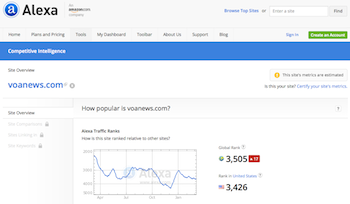
VOANEWS.COM Alexa rank: 3,505 (1 is Best)
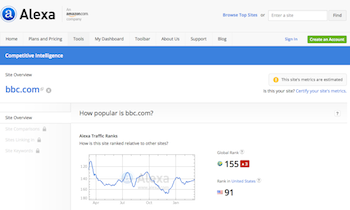
BBC.COM Alexa Rank: 155
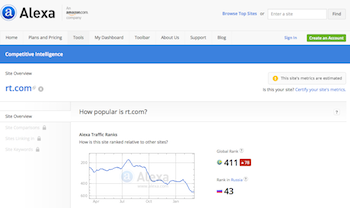
RT.COM Alexa Rank: 411
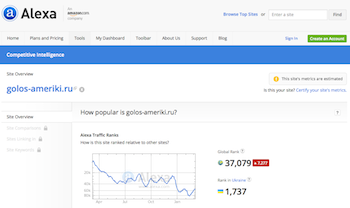
VOA RUSSIAN GOLOS-AMERIKI.RU Alexa Rank: 37,079 (1 is Best)
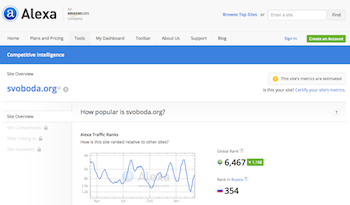
RFE/RL RUSSIAN SVOBODA.ORG Alexa Rank: 6,467

VOA RUSSIAN FACEBOOK LIKES: 39,900

BBC RUSSIAN FACEBOOK LIKES: 336,950
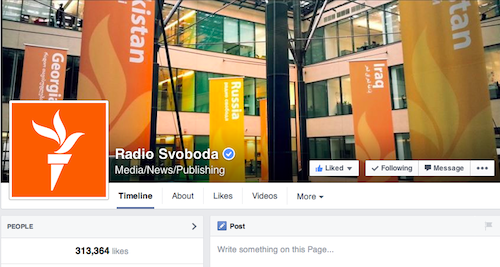
RFE/RL RUSSIAN FACEBOOK LIKES: 313,364

VOA ENGLISH NEWS FACEBOOK LIKES: 898,337
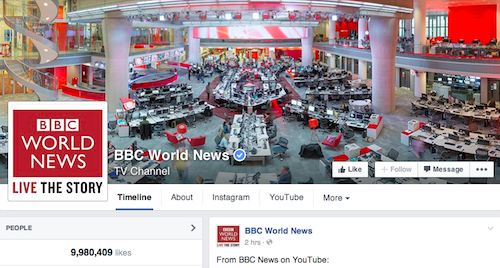
BBC WORLD ENGLISH NEWS FACEBOOK LIKES: 9,980,409

RT ENGLISH NEWS FACEBOOK LIKES: 2,433,372

VOA YOUTUBE: 42,505 Subscribers | 39,827,781 Views
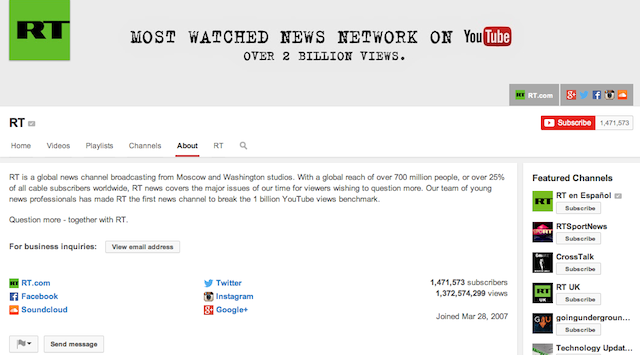
RT YOUTUBE: 1,471,573 Subscribers | 1,372,574,299 Views RT International, RT’s English-language news channel, leads the way with 1.3 billion views and 1.4 million subscribers. All RT videos (English and in other languages) account for more than 2 billion views.
In light of these results for the Voice of America, the language in the Broadcasting Board of Governors FY 2016 Budget Request is truly long, bureaucratic and deceptive.
In addition to poor web and social media outreach, the Voice of America, unlike the BBC, has long ago been deprived by the BBG bureaucrats of most of its traditional radio and TV broadcasting capabilities.
VOA does not have any 24/7 English language radio and TV news and information programs or any programs of any significant length.
What BBG bureaucrats now do to keep themselves employed is to claim various audiences to programs placed on other stations. Most of these placed programs are short reports and light features. Some are pre-censored to eliminate offending news. Many of such placed programs are non-news and non-political. Many are placed in countries that already have free media. Under the BBG’s management in recent years, the Voice of America has ceased to be a traditional news broadcaster and certainly has not become a new digital media news player of any significance.
We invite you to compare recent BBC and RT press releases with the Broadcasting Board of Governors FY 2016 Budget Request. BBC certainly has good reasons to be proud, but you will notice that BBC does not use any of the empty phrases and words found in abundance in the BBG document.
The language of RT press releases is closer to the language of the BBG document, but at least RT has apparently achieved large audience gains in the Middle East. It is doing phenomenally well on YouTube, where VOA does not even come close to matching RT’s numbers.
One interesting and somewhat encouraging piece of information from the RT press release is that BBG’s Middle East Broadcasting Network’s (MBN) Alhurra TV is a significant media player in Iraq.
###
BBC MEDIA CENTRE PRESS RELEASE
BBC.com users hit 100 million mark
These fantastic figures demonstrate the global demand for comprehensive coverage of world events. Our ambition is to ensure audiences are able to access world-class, up-to-the-minute news and in-depth analysis across both text and video, regardless of which platform they’re on – as the stories break and beyond.
Fran Unsworth, Director, World Service Group
Date: 05.02.2015 Last updated: 05.02.2015 at 14.08
Category: BBC World News; BBC Worldwide
New figures* show that BBC.com, the BBC’s international website, has started 2015 on an all-time high. More than 101 million unique browsers used the website and news app globally during the month of January, generating a record 1.35 billion page views.
The figures come after a year which saw BBC.com achieve sustained growth, with more unique browsers every quarter. Mobile and tablet usage of BBC.com has increased, with year-on-year unique browsers up 67% and 45% respectively, as greater choice and responsive technology encouraged users to turn to BBC.com for news on the go. A fully responsive tablet version of the site launched in late 2014 and a new feature-packed update to the BBC News app is due to launch in the coming months.
The driving factors for January’s figures were coverage of major global news stories, such as the Paris attacks, along with human interest stories including the resurgence of a piece about why Finnish babies sleep in boxes. Features sections such as BBC Capital and BBC Earth achieved new peak figures for page views of 7.1m and 5.1m respectively, with stories on the best places to retire around the world and the Earth’s biggest turning points proving particularly popular. While Culture’s the 10 biggest Oscar snubs ever, became a favourite with audiences across the globe.
Fran Unsworth, Director of the World Service Group, says: “These fantastic figures demonstrate the global demand for comprehensive coverage of world events. Our ambition is to ensure audiences are able to access world-class, up-to-the-minute news and in-depth analysis across both text and video, regardless of which platform they’re on – as the stories break and beyond.”
Tim Davie, CEO BBC Worldwide, adds: “It is tremendous news that BBC.com has been enjoyed by over 100 million browsers in the past month. The fact that audiences are responding positively to the innovation that we have delivered across the site is particularly encouraging. Specifically, our investments across genres as well as our increasing availability across all devices, is driving strong growth.”
The BBC’s digital success also extends to social media where it was the most-shared news brand on Twitter every single month last year according to NewsWhip, with stories being shared up to 4 million times a month.
AC
BBC MEDIA CENTRE PRESS RELEASE
BBC World News reaches new distribution milestone
We are delighted to be growing so quickly in the US on all platforms and to be available to TV subscribers nationwide for the first time
Jim Egan, Chief Executive Officer, BBC Global News Ltd
Date: 06.03.2015 Last updated: 06.03.2015 at 17.10
Category: BBC World News
Global TV news network now available in more than 40 million U.S. homes
New York, March 6, 2015. The BBC’s award-winning 24-hour global news network BBC World News has reached a major distribution milestone, and is now available in more than 40 million U.S. homes and in every major U.S. market*. The fast growing channel, which is widely available in HD, has experienced significant distribution gains as a result of new multichannel operator deals.
Top U.S. distributors including DirecTV, Comcast, Time Warner Cable, Verizon, Charter, AT&T U-verse and Cablevision, are now all carrying the BBC’s 24 hour news network.
The expanded distribution is due in part to new carriage deals secured by AMC Networks, which represents BBC World News in distribution, as part of a broader partnership announced in October 2014, and means that the network is now available on a full-time basis in all television markets in the U.S.
Jim Egan, Chief Executive Officer, BBC Global News Ltd, says: “In a profoundly interconnected and uncertain world, audiences want a global news source they can trust. With correspondents in more countries than any other news provider only the BBC can offer US viewers authoritative, fast-paced reporting of the latest news from around the world and an intelligent, truly objective perspective on America’s place in it. We are delighted to be growing so quickly in the US on all platforms and to be available to TV subscribers nationwide for the first time.”
BBC World News has the largest audience of any BBC channel in the world, broadcasting in over 200 countries and territories and with journalists in more than 85 international newsgathering bureaus globally. In January 2013 the BBC re-launched the network from new state of the art studios in London, as well as investing in new programming and global newsgathering. Programming highlights on the network include the Emmy©-winning daily newscast, World News America, anchored by Katty Kay from the BBC’s studio in Washington DC.
The BBC is enjoying growth across all of its platforms in the U.S, including online and radio as well as TV.
More than 101 million unique browsers visited BBC.com and the BBC News app globally during the month of January 2015, generating a record 1.35 billion page views, which was an all-time high. In the U.S, BBC.com attracted more than 38 million unique visitors across desktop and mobile devices during the same period, a 49 percent year on year increase**.
Alongside the BBC’s TV and digital offerings, more than 500 local public radio stations in the U.S broadcast BBC World Service content – mainly news and current affairs programming, including the flagship global newscast Newshour, reaching 10.5 million listeners a week***. In the U.S, BBC World Service English radio content is distributed by American Public Media™ (APM).
AC2
###
RT PRESS RELEASE
RT ARABIC IS AMONG TOP-3 MOST WATCHED NEWS CHANNELS IN 6 ARABIC COUNTRIES
19.02.2015 16:41
MOSCOW, FEBRUARY 19, 2015 – RT’s Arabic-language news channel has higher daily audience in six MENA countries than UK’s BBC Arabic and Sky News Arabia, US’ Al Hurra and China’s CCTV in Arabic, placing it among the top three most watched news channels in the surveyed states. In Egypt, Morocco, Saudi Arabia, Jordan, UAE and Iraq RT Arabic is watched by 6.7 million viewers every day.
Eighteen percent of all residents in these six countries have watched RT at least once, making up 18.2 million people. Approximately 11.5 million – or 11% – of those are estimated to have watched the channel during the previous month, which puts RT ahead of Deutsche Welle Arabic, CCTV Arabic, France 24 Arabic, Al Alam News, and Sky News Arabia.
Among the surveyed countries, RT demonstrated the best performance in Iraq: its daily viewership there makes up about 44% of the country’s population. Here RT is also ahead of BBC Arabic, Sky News, France 24, Deutsche Welle, CCTV, Al Hurra and Al Alam News. RT’s audience in the country is also the most loyal compared to all competing channels: 98% of weekly viewers watch the channel daily, vs. 93% of Al Arabiya, 85% of Al Jazeera, 66% of Al Hurra and 64% of BBC Arabic viewers. Remarkably, of all Iraqis who have ever watched RT, 100 percent watched it over the past month.
RT also ranks number one in terms of viewer trust. Only three percent of those, who are aware of the channel, but do not watch it, cited mistrust of RT’s news reports as a reason for not watching the channel. This rate was 30% for Al Jazeera, 9% for Al Arabiya, 6% for the BBC Arabic, 8% for Al Hurra, and 6% for Sky News Arabia.
According to the study, 30% of RT Arabic’s monthly audience in Egypt like the channel for its “relevant and reliable news reports,” while 20% in the UAE and 14% in Saudi Arabia like it for its “alternative opinions,” and being “distinct from other networks.”
Another remarkable statistic is that 59% percent of RT Arabic’s audience watch it for more than an hour a day on weekdays, while 38% of its viewers watch the channel for more than an hour a day on weekends. RT is similarly ahead of all its competitors in the region by its daily-to-weekly viewership conversion ratio: 74% percent of RT’s weekly audience watch the channel over last one day.
The study also shows that 57% of RT’s monthly audience in the six surveyed counties are either top managers, mid-level or junior executives of companies and organizations as well as professionals and office workers (according to the social status system NRS corresponds to socio-economic classes A, B and C1). Here RT also leads vis-a-vis the competition: these types of viewers make up 56% of the audience of Sky News, 54% of Al Alam News and 45% of CCTV. RT also boasts the largest share of audience between the ages of 25 and 34 – 30%.
Compared to the Nielsen’s 2010 study, RT’s monthly audience has grown by 2.18 million people across Egypt, Saudi Arabia, Jordan and the UAE. RT’s monthly viewership in Egypt has shown the largest growth, increasing by 112 percent and surpassing the growth exhibited by Al Hurra, Al Alam News, Al Arabiya, and Al Jazeera over the same period.
Results of Nielsen Arab Study conducted in July-August 2014. The survey involved more than 5500 Arabic-speaking viewers of news on TV over the age of 18 (male and female, all socio-economic classes). Channels surveyed were RT Arabic, BBC Arabic, Al Jazeera, Al Arabiya, Sky News Arabia, France 24 Arabic, Deutsche Welle Arabic, CCTV in Arabic, Al Hurra and Al Alam News. Countries surveyed were Egypt, Morocco, Saudi Arabia, Jordan, UAE and Iraq. 2010 Nielsen study surveyed TV audience in Egypt, Saudi Arabia, Jordan, UAE, Kuwait, Syria and Lebanon.
###
RT PRESS RELEASE
RT IS #1 NEWS NETWORK ON YOUTUBE WITH 2BLN VIEWS
16.12.2014 19:35
MOSCOW, DECEMBER 16, 2014 – RT’s five main channels on YouTube have racked up more than 2 billion views in total, outperforming all other international TV news networks.
RT’s YouTube presence includes channels in English, Russian, Spanish, and Arabic, plus a separate RT America news channel. With over 2 billion views in total, RT is far ahead of its main competitors, outperforming CNN more than three times, Al Jazeera by 2.4 times, and Euronews by 3.6 times.
“Such a significant number shows that RT continues to lead in promoting alternative opinions online – the space that used to be dominated by the mainstream media,” RT’s Editor-in-Chief Margarita Simonyan commented on the achievement. “We are proud of this, and we will continue working hard to remain YouTube’s number one TV news channel.”
RT is also far ahead of all its competitors by the total number of YouTube subscribers. With more than 2.5 million followers, RT beats BBC News by 5.2 times, Euronews – 5 times, CNN, by 2.8 times, and Al Jazeera by almost two times.
Yuri Khazanov, the head of YouTube’s partnership program in Russia and CIS, commented that “Reaching more than 2 billion views and 2.5 million subscribers confirms RT’s status as the largest TV news network on YouTube.”
RT International, RT’s English-language news channel, leads the way with 1.3 billion views and 1.4 million subscribers. In 2014 RT International was honored with a Gold YouTube Play Button, awarded to channels with more than one million subscribers. RT’s channels in other languages, boasting more than 100,000 subscribers each, were distinguished with Silver Play Buttons.
RT’s flagship channel is the world’s first news media to garner 1 billion views on YouTube. RT’s footage of the meteorite crash in the Chelyabinsk Region became YouTube’s top news video of 2013, with 38 million views. In 2012,the Pew Research Center named RT as the most popular news channel on YouTube.
###
BBG PRESS RELEASE
BBG 2016 Budget Request Calls For Expansion In Key Markets And Technologies
MARCH 10, 2015
WASHINGTON – The Broadcasting Board of Governors (BBG) today released its detailed Fiscal Year 2016 budget request. The agency, which oversees civilian international news and information programs for people in more than 100 countries, is seeking $751.5 million to increase global engagement, move more aggressively into television and digital media, and support high priority audiences.
“Our goal is to help U.S. international media nimbly respond at a time of pressing national security challenges as well as dramatic shifts in the way people around the world engage with media,” said BBG Chairman Jeff Shell. “As authoritarian governments tighten their grip on media and extremist groups exploit it to sow hatred and fear, our role is to engage audiences and bring a trusted voice to those who need it most.”
The budget request prioritizes expanding avenues to reach Russian-speaking audiences. The proposed investment of $15.4 million would increase Russian-language TV programming, as well as grow multi-platform digital engagement efforts toward the region.
In accordance with U.S. foreign policy needs, the budget includes investments to expand outreach to key audiences to counter ISIL narratives and enable everyday citizens to have their voices heard. The proposal furthers migration to HD TV and digital media. The total funding for new investments is almost $28 million.
The 2016 budget includes a request for the BBG to establish an independent grantee organization to carry out broadcasting and related activities to Latin America and Cuba.
In addition, supporting a free and open Internet is included in the request, with $12.5 million in funds proposed in FY 2016 for the BBG’s Internet anti-censorship programs.
Proposed budget reductions include trimming administrative costs, harmonizing services and eliminating language overlaps, closing lower priority language services, and reducing related transmissions. The agency would save about $15.6 million under this budget request. Such reductions will be taken in order to sustain core journalistic operations.
The agency continues to leverage recent investments, corresponding to national security priorities, in programming and distribution in Africa, East Asia, and the Middle East.
Further information regarding the BBG’s FY 2016 budget submission can be found here in the FY 2016 Budget Request.
